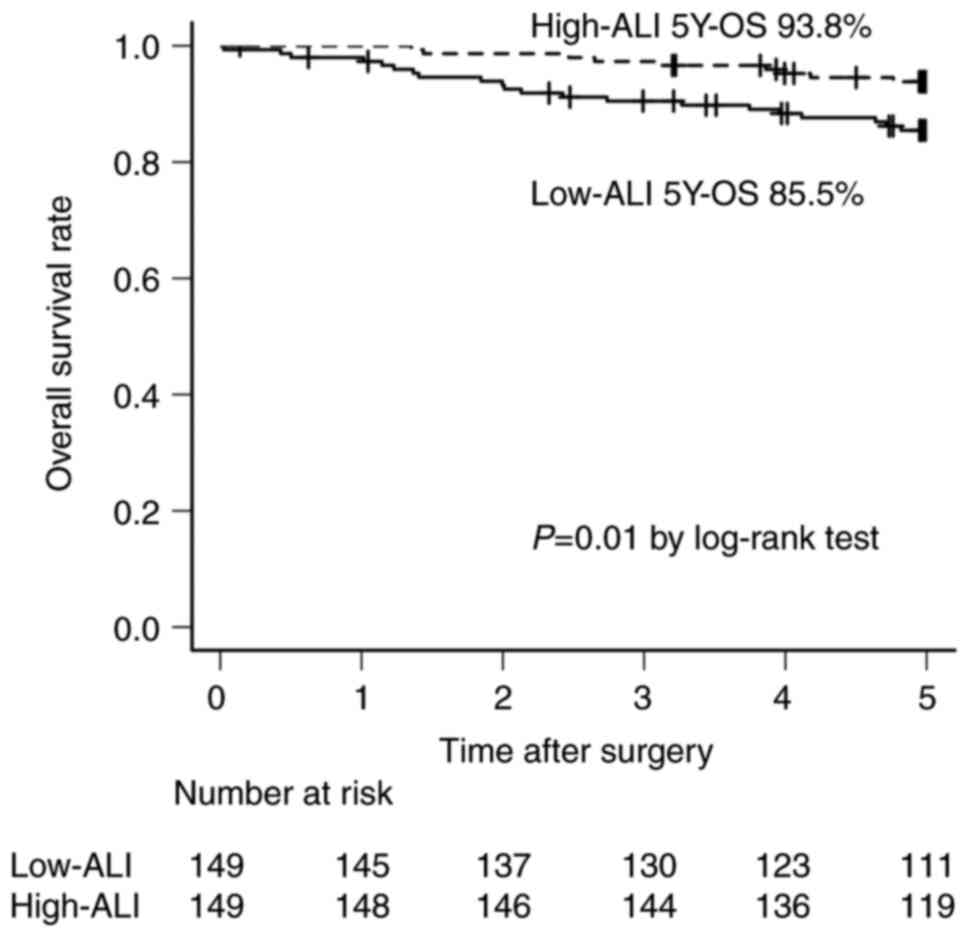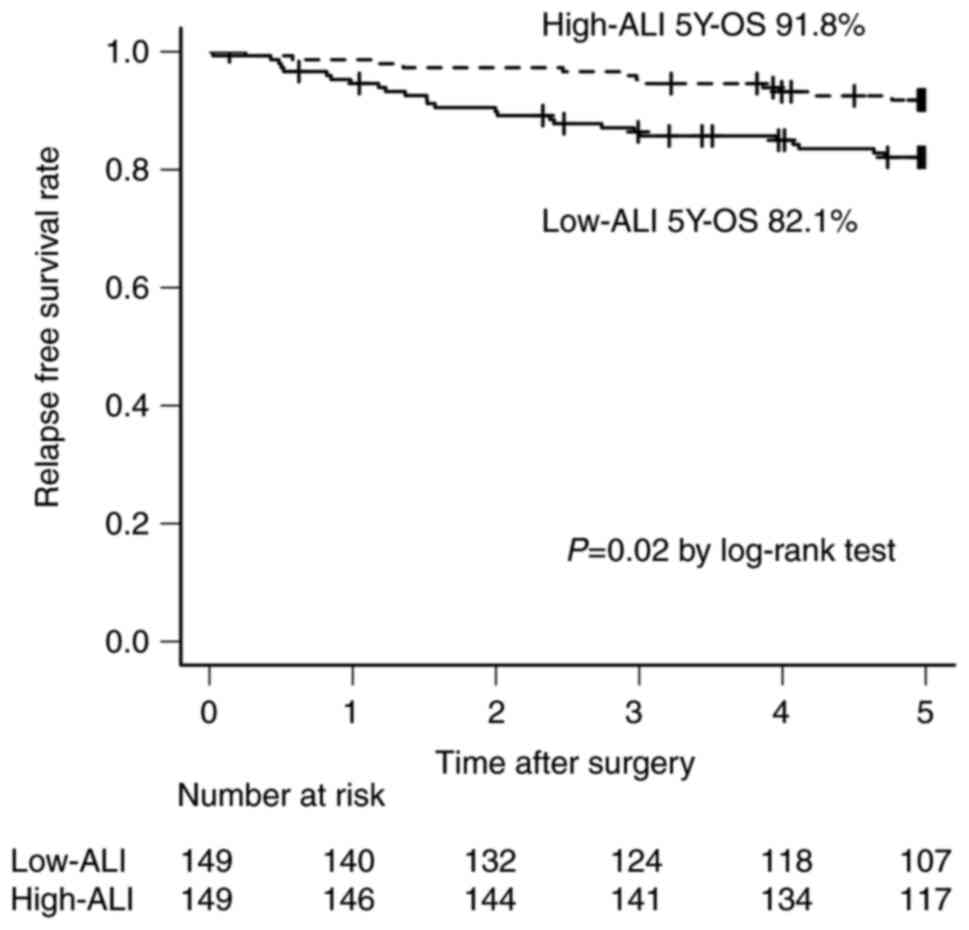|
1
|
Sung H, Ferlay J, Siegel RL, Laversanne M,
Soerjomataram I, Jemal A and Bray F: Global cancer statistics 2020:
GLOBOCAN estimates of incidence and mortality worldwide for 36
cancers in 185 countries. CA Cancer J Clin. 71:209–249. 2021.
View Article : Google Scholar : PubMed/NCBI
|
|
2
|
Smyth EC, Nilsson M, Grabsch HI, van
Grieken NC and Lordick F: Gastric cancer. Lancet. 396:635–648.
2020. View Article : Google Scholar : PubMed/NCBI
|
|
3
|
Ishikawa D, Nishi M, Takasu C, Kashihara
H, Tokunaga T, Higashijima J, Yoshikawa K and Shimada MT: The role
of neutrophil-to-lymphocyte ratio on the effect of CRT for patients
with rectal cancer. In Vivo. 34:863–868. 2020. View Article : Google Scholar : PubMed/NCBI
|
|
4
|
Fukuda N, Toda K, Fujiwara YU, Wang X,
Ohmoto A, Urasaki T, Hayashi N, Sato Y, Nakano K, Yunokawa M, et
al: Neutrophil-to-lymphocyte ratio as a prognostic marker for
anaplastic thyroid cancer treated with lenvatinib. In Vivo.
34:2859–2864. 2020. View Article : Google Scholar : PubMed/NCBI
|
|
5
|
Hayama T, Ozawa T, Tsukamoto M, Fukushima
Y, Shimada R, Nozawa K, Matsuda K, Fujii S, Fukagawa T and
Hashiguchi Y: Predicting overall survival using preoperative
nutritional and inflammation status for colorectal cancer. In Vivo.
36:450–457. 2022. View Article : Google Scholar : PubMed/NCBI
|
|
6
|
Tsukioka T, Izumi N, Komatsu H, Inoue H,
Ito R, Suzuki S and Nishiyama N: Elevation of
neutrophil-to-lymphocyte ratio is a significant poor prognostic
factor in completely resected centrally located lung squamous cell
carcinoma. In Vivo. 36:2303–2307. 2022. View Article : Google Scholar : PubMed/NCBI
|
|
7
|
Hsueh WH, Hsueh SW, Yeh KY, Hung YS, Ho
MM, Lin SY, Tseng CK, Hung CY and Chou WC: Albumin and
neutrophil-to-lymphocyte ratio score in neoadjuvant concurrent
chemoradiotherapy for esophageal cancer: Comparison with prognostic
nutritional index. In Vivo. 36:2400–2408. 2022. View Article : Google Scholar : PubMed/NCBI
|
|
8
|
Hsu CC, Chou WC, Hung YS, Lin SY, Hung CY,
Yeh KY, Wang HM and Lu CH: Predictive value of albumin and
neutrophil-to-lymphocyte ratio score for treatment completeness and
safety profiles in patients with head and neck cancer receiving
definitive concurrent chemoradiotherapy. In Vivo. 36:2875–2883.
2022. View Article : Google Scholar : PubMed/NCBI
|
|
9
|
Aoyama T, Kazama K, Maezawa Y and Hara K:
Usefulness of nutrition and inflammation assessment tools in
esophageal cancer treatment. In Vivo. 37:22–35. 2023. View Article : Google Scholar : PubMed/NCBI
|
|
10
|
Deng Q, He B, Liu X, Yue J, Ying H, Pan Y,
Sun H, Chen J, Wang F, Gao T, et al: Prognostic value of
pre-operative inflammatory response biomarkers in gastric cancer
patients and the construction of a predictive model. J Transl Med.
13:662015. View Article : Google Scholar : PubMed/NCBI
|
|
11
|
Aoyama T, Hara K, Kazama K and Maezawa Y:
Clinical impact of nutrition and inflammation assessment tools in
gastric cancer treatment. Anticancer Res. 42:5167–5180. 2022.
View Article : Google Scholar : PubMed/NCBI
|
|
12
|
Hirahara N, Matsubara T, Kaji S, Hayashi
H, Sasaki Y, Kawakami K, Hyakudomi R, Yamamoto T and Tajima Y:
Novel inflammation-combined prognostic index to predict survival
outcomes in patients with gastric cancer. Oncotarget. 14:71–82.
2023. View Article : Google Scholar : PubMed/NCBI
|
|
13
|
Jafri SH, Shi R and Mills G: Advance lung
cancer inflammation index (ALI) at diagnosis is a prognostic marker
in patients with metastatic non-small cell lung cancer (NSCLC): A
retrospective review. BMC Cancer. 13:1582013. View Article : Google Scholar : PubMed/NCBI
|
|
14
|
Zhao Q, Chen S and Feng JF: A novel
inflammation-based prognostic index for patients with esophageal
squamous cell carcinoma: Neutrophil lymphocyte ratio/albumin ratio.
Oncotarget. 8:103535–103542. 2017. View Article : Google Scholar : PubMed/NCBI
|
|
15
|
Jun DH, Kim BJ, Park JH, Kim JG, Chi KC,
Park JM, Kim MK and Kang H: Preoperative body mass index
maydetermine the prognosis of advanced gastric cancer. Nutr Cancer.
68:1295–1300. 2016. View Article : Google Scholar : PubMed/NCBI
|
|
16
|
He X, Zhou T, Yang Y, Hong S, Zhan J, Hu
Z, Fang W, Qin T, Ma Y, Zhao Y, et al: Advanced lung cancer
inflammation index, a new prognostic score, predicts outcome in
patients with small-cell lung cancer. Clin Lung Cancer.
16:e165–e171. 2015. View Article : Google Scholar : PubMed/NCBI
|
|
17
|
Park YH, Yi HG, Lee MH, Kim CS and Lim JH:
Prognostic value of the pretreatment advanced lung cancer
inflammation index (ALI) in diffuse large B cell lymphoma patients
treated with R-CHOP chemotherapy. Acta Haematol. 137:76–85. 2017.
View Article : Google Scholar : PubMed/NCBI
|
|
18
|
Jank BJ, Kadletz L, Schnöll J, Selzer E,
Perisanidis C and Heiduschka G: Prognostic value of advanced lung
cancer inflammation index in head and neck squamous cell carcinoma.
Eur Arch Otorhinolaryngol. 276:1487–1492. 2019. View Article : Google Scholar : PubMed/NCBI
|
|
19
|
Yin C, Toiyama Y, Okugawa Y, Omura Y,
Kusunoki Y, Kusunoki K, Imaoka Y, Yasuda H, Ohi M and Kusunoki M:
Clinical significance of advanced lung cancer inflammation index, a
nutritional and inflammation index, in gastric cancer patients
after surgical resection: A propensity score matching analysis.
Clin Nutr. 40:1130–1136. 2021. View Article : Google Scholar : PubMed/NCBI
|
|
20
|
Zhang X, Wang D, Sun T, Li W and Dang C:
Advanced lung cancer inflammation index (ALI) predicts prognosis of
patients with gastric cancer after surgical resection. BMC Cancer.
22:6842022. View Article : Google Scholar : PubMed/NCBI
|
|
21
|
Chen H, Zhang F, Luo D, Guo J, Lin Y, Chen
S, Yin S, Chen X, Peng J and Lian L: Advanced lung cancer
inflammation index predicts the outcomes of patients with
non-metastatic gastric cancer after radical surgical resection. J
Gastrointest Oncol. 14:85–96. 2023. View Article : Google Scholar : PubMed/NCBI
|
|
22
|
Huo C, Liu Y, Xie F, Zhao L, Huang H and
Feng Q: Advanced lung cancer inflammation index predicts the
outcomes of patients with non-metastatic gastric cancer after
radical surgical resection. J Gastrointest Oncol. 14:1653–1654.
2023. View Article : Google Scholar : PubMed/NCBI
|
|
23
|
Wang X, Liu X, Dai H and Jia J: Peripheral
blood nutrient indices as biomarkers for anti-PD-1 therapy efficacy
and prognosis in patients with advanced gastric cancer. Oncol Lett.
26:3972023. View Article : Google Scholar : PubMed/NCBI
|
|
24
|
Feng JF, Huang Y and Chen QX: A new
inflammation index is useful for patients with esophageal squamous
cell carcinoma. Onco Targets Ther. 7:1811–1815. 2014. View Article : Google Scholar : PubMed/NCBI
|
|
25
|
Tan X, Peng H, Gu P, Chen M and Wang Y:
Prognostic significance of the L3 skeletal muscle index and
advanced lung cancer inflammation index in elderly patients with
esophageal cancer. Cancer Manag Res. 13:3133–3143. 2021. View Article : Google Scholar : PubMed/NCBI
|
|
26
|
Kusunoki K, Toiyama Y, Okugawa Y, Yamamoto
A, Omura Y, Ohi M, Araki T and Kusunoki M: Advanced lung cancer
inflammation index predicts outcomes of patients with colorectal
cancer after surgical resection. Dis Colon Rectum. 63:1242–1250.
2020. View Article : Google Scholar : PubMed/NCBI
|
|
27
|
Zhang B, Li ZW, Tong Y, Yuan C, Liu XY,
Wei ZQ, Zhang W and Peng D: The predictive value of advanced lung
cancer inflammation index for short-term outcomes and prognosis of
colorectal cancer patients who underwent radical surgery. Int J
Clin Oncol. 28:1616–1624. 2023. View Article : Google Scholar : PubMed/NCBI
|
|
28
|
Park SH, Lee S, Song JH, Choi S, Cho M,
Kwon IG, Son T, Kim HI, Cheong JH, Hyung WJ, et al: Prognostic
significance of body mass index and prognostic nutritional index in
stage II/III gastric cancer. Eur J Surg Oncol. 46:620–625. 2020.
View Article : Google Scholar : PubMed/NCBI
|
|
29
|
Hashimoto I, Kano K, Onuma S, Suematsu H,
Nagasawa S, Kanematsu K, Furusawa K, Hamaguchi T, Watanabe M,
Hayashi K, et al: Clinical significance of neutrophil-to-lymphocyte
ratio/serum albumin ratio in patients with metastatic gastric or
gastroesophageal junction cancer administered
trifluridine/tipiracil. Anticancer Res. 43:1689–1697. 2023.
View Article : Google Scholar : PubMed/NCBI
|
|
30
|
Onuma S, Hashimoto I, Suematsu H, Nagasawa
S, Kanematsu K, Aoyama T, Yamada T, Rino Y, Ogata T and Oshima T:
Clinical effects of the neutrophil-to-lymphocyte ratio/serum
albumin ratio in patients with gastric cancer after gastrectomy. J
Pers Med. 13:4322023. View Article : Google Scholar : PubMed/NCBI
|
|
31
|
Yamamoto K, Nagatsuma Y, Fukuda Y, Hirao
M, Nishikawa K, Miyamoto A, Ikeda M, Nakamori S, Sekimoto M,
Fujitani K and Tsujinaka T: Effectiveness of a preoperative
exercise and nutritional support program for elderly sarcopenic
patients with gastric cancer. Gastric Cancer. 20:913–918. 2017.
View Article : Google Scholar : PubMed/NCBI
|
















